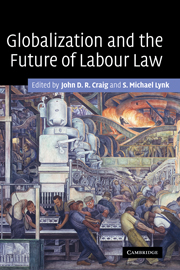Book contents
- Frontmatter
- Contents
- Notes on contributors
- Acknowledgements
- Table of cases
- List of abbreviations
- Introduction
- PART I Perspectives on globalization
- PART II International labour standards
- PART III The European Union
- PART IV The Americas
- PART V The ILO
- PART VI Labour rights
- 14 Securing gender justice: the challenges facing international labour law
- 15 International labour law and the protection of migrant workers: revitalizing the agenda in the era of globalization
- Bibliography
- Index
14 - Securing gender justice: the challenges facing international labour law
Published online by Cambridge University Press: 23 July 2009
- Frontmatter
- Contents
- Notes on contributors
- Acknowledgements
- Table of cases
- List of abbreviations
- Introduction
- PART I Perspectives on globalization
- PART II International labour standards
- PART III The European Union
- PART IV The Americas
- PART V The ILO
- PART VI Labour rights
- 14 Securing gender justice: the challenges facing international labour law
- 15 International labour law and the protection of migrant workers: revitalizing the agenda in the era of globalization
- Bibliography
- Index
Summary
Introduction
Widespread gender inequality continues to be entrenched in global labour markets notwithstanding the positive gains women have made and the existence of international norms and legal obligations which prohibit such discrimination. The international labour law system, originally developed on the basis of the male model of “standard” employment”, is now evolving to address the protection of women's work. This includes addressing the shift to the new “feminized” global economy where women's jobs are often precarious, substandard and low wage, where many women have no formal job at all, and where women continue to bear the many burdens of family and community responsibilities.
The international labour law system has been fundamentally challenged by the forces of globalization which seek to move large volumes of goods, services, information and capital across international borders with low friction and high velocity. Workers', and particularly women workers', rights stand in the way of this global whirlwind as labour lacks capital's mobility advantage and is subject to the threat of global capital moving to regions with lower standards. The international business community has had significant success in requiring nation states to ease, not legislate or not enforce labour and equality protections so as to attract and retain transnational companies and permit local businesses to compete in the global production system. The result has been structural adjustment programmes, privatization of state services, anti-collective bargaining laws and business-friendly export processing zones.
- Type
- Chapter
- Information
- Globalization and the Future of Labour Law , pp. 377 - 408Publisher: Cambridge University PressPrint publication year: 2006
- 4
- Cited by



